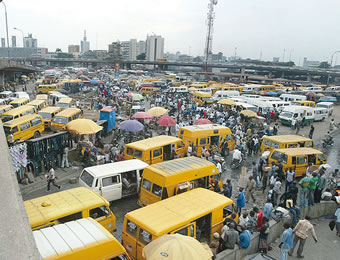In Lagos, confusion reigns supreme over who is really in charge of an average commercial bus on the road, as there seems to be a raging controversy over who calls the shot between the driver and the bus conductor. BOLA BADMUS, LEKAN OLABULO, ELLIOT OVADJE and KASALI QUDUS, in this report, seek to unravel the poser.
Lagos is no doubt the commercial capital of Nigeria with varying daily experiences that often leave one to wonder if what obtains there is also the same elsewhere. One cannot but continue to marvel at some of the occurrences in Lagos, including daily routines such as travelling in commercial buses where one could see insults being hurled here and there, altercations, exchange of expletives and, sometimes, fisticuffs between bus conductors and their passengers. But, more often, all these occur between a driver and his conductor, while passengers will be left with no choice but to sit back and enjoy the drama as it unfolds.
Indeed, Lagos is where, for many passengers, it would look as if there is a battle for supremacy between bus drivers and their conductors. Truly speaking, the attitude and behaviour of some bus conductors across the state tend to give an impression that they are more in charge than their drivers.
A more common experience is the fact that bus conductors in Lagos are the ones that dictate the transport fare that passengers are supposed to pay for a trip and when attempts are made by passengers to ask the drivers how much the fare is, especially when the conductors are busy engaging some union (NURTW) members over some settlements, the driver would simply direct them to the conductors, thereby suggesting that the conductors are really the ones in charge.
Not quite long ago, as one of our correspondents was journeying from Oshodi to Iyana-Ipaja in a commercial bus, popularly known as danfo or faragon, he noticed that a passenger and a bus conductor were engaged in a heated exchange of words. The passenger, a female, insisted on collecting her change from the recalcitrant conductor who, despite entreaties from other passengers, was adamant that he would not give her.
Meanwhile, the driver, who appeared not to be too comfortable with the situation of things and, perhaps because he was not being allowed to concentrate on the driving, asked the conductor to give the aggrieved female passenger her remaining change so that peace would reign in the bus. Yet, the conductor refused, insisting that the woman had no money to collect, claiming that she had paid the exact fare for the journey.
Another drama that suggested a supremacy battle between drivers and conductors was witnessed by Saturday Tribune during a recent trip on the Lagos-Abeokuta Expressway. The incident occurred in a faragon bus which was heading for Agege and had taken off from the old Toll Gate end of the ever-busy expressway, which serves as the boundary between Lagos and Ogun states.
Right from the Toll Gate, the journey immediately assumed a tortuous dimension, as the conductor was hostile to almost all the passengers in the commercial bus. From one bus stop to another, he was picking quarrels with passengers at the slightest provocation, while the driver strangely decided to keep quiet, even when the passengers expected him to, at least call, his conductor to order. The conductor’s misdemeanour and continuous delay at almost each of the bus stops along the route, in the name of looking for passengers, made some passengers to get off the bus, midway in their journey. Yet, the conductor remained unremorseful of his hostile attitude.
The bus, following the same pattern, stopped at Meiran, a popular bus stop on the expressway, where a female police officer jumped into the front seat of the bus and ordered the driver to bring the vehicle to a halt. The driver signaled to the conductor to settle (bribe) the police officer, but the recalcitrant conductor ignored him. The driver was thus forced to speak out for the first time since the journey started, but again, the conductor did not budge. By this time, two other police officers had jumped into the vehicle, insisting that, for refusing to “comply” and for wasting their “precious” time, the bus would be taken to their station, thus bringing the short but largely acrimonious journey to an abrupt end.
The above scenario clearly again subtly explains the intrigues and power play between commercial bus drivers and conductors in Lagos State. It is naturally believed that drivers, ordinarily, are in control of commercial bus operations but Saturday Tribune observed that years of experience, clout, influence and relationship with vehicle owners, among others, are really the factors that determine who calls the shot between the driver and the conductor.
Baba, a commercial bus driver, had this to say to Saturday Tribune, in his response to questions relating to the issue: “There are two categories of drivers: those that graduated from being bus conductors to drivers, thus making them to be vastly experienced in the trade and there are those who joined just to make ends without having the necessary experience.”
He further said, “Naturally some people are quiet yet active, while over 90 per cent of those who graduated from being conductors to drivers are in total control of the vehicle. They know the intrigues and the conductors know them very well. Such drivers determine almost everything and the conductors respect their judgment.
“We all know that, in life, everything has to do with experience and this job of ours is not exempted. Each road or route has its own intrigues and everyone knows our dealings with transport union members, as well as with security and traffic management officials. Therefore, if you don’t have the experience, you may just be working for others people’s benefit.”
Baba also said closeness to the real owner of the vehicle is also of importance in this regard, ”as a conductor who is closer to the bus owner will want to control the driver who is equally employed to drive the bus, simply because he (conductor) has the trust of the owner.”
But sharing a somewhat different opinion, Joel, a commercial driver said, “the driver is always the master but that is if he knows what he is doing. No conductor should control you. I am the master. I seek advice from my conductors but I determine who works with me or not; I determine the routes; I determine the fares and I determine who gets what from our money.
“Everything has to do with exposure. Even if you graduated from being a conductor to a driver and you do not allow that experience to get into you, some conductors will still control your business”, Joel further said.
For some other commercial drivers, years of experience may not indeed count. This is the stand of Mr Segun Ishola, who operates between Onipanu and Bajulaiye in Shomolu area of Lagos. Despite his 10 years of driving a commercial bus, Ishola admitted to Saturday Tribune that he still allows his conductors to “control” him, at least, if only to give room for peace to reign, while he focuses on driving.
“When talking about who calls the shot between a conductor and a driver in a commercial transportation business, I will say that the conductor owes a lot of responsibilities because quite often he knows the in and out of the job, even better than the driver”, he added.
Ishola however admitted that commercial transportation business had changed tremendously in the past few years, as against what it used to be when conductors were largely more obedient and focused. According to him, nowadays, the excesses and overbearing attitude of most of the bus conductors had forced a lot of drivers to be doing their businesses without employing the services of a conductor. “Nowadays, a major reason why drivers don’t employ the services of conductors very often anymore is the continuous conflict and disagreement between conductors and passengers”, he said.
Narrating his own experience, Ishola said, “After receiving the bus I drive from its owner, I had to employ the services of a conductor. Initially, everything was okay but, after a while, the conductor took over the control of the bus and now he is the one who tells me the route to take and the ones to avoid.”
Another driver, Emmanuel Nnoli, who plies his trade between Ikeja and Alausa and has been in the business for about 15 years, introduced a comic dimension to the whole issue when he insisted that the “remote control” of any bus belonged to the conductor, while the driver only had a small sphere of influence. “The reason is because the conductor collects money from the passengers; the conductor tells the driver where to stop and when to move; and the conductor tells the passengers the rules governing the bus.
“The driver may be the person who got the contract or may even be owner of the bus, but it is the conductor that knows the route. In most cases, he (the conductor) is the one who understands how to handle the agberos (levy-collecting errand boys of the transport union) in terms of the amount to be paid to the National Union of Road Transport Workers (NURTW)”, he added.
However, there are indications that the rightful owners of buses, at times, prefer to operate as conductors so as to be fully in charge of the money made, as there have been numerous cases of conductors pocketing part of the proceeds. Thus, such owner-conductor cannot be expected not to be bossy to their employed drivers and, in some instances, even to the passengers.
An indication about the possibility of a bus owner turning a conductor was authenticated by the experience of a bus conductor at the Ikorodu Park. Giving his name as AdegbenroTaofik, the conductor claimed to be the owner of the bus where he operates as a conductor, saying this had given him the power to be fully in charge of the money made, who to pay levies to, which routes to ply and which passengers to take, among others.
Taofik, who is popularly referred to as Ade, said he had been in the transportation business for about eight years, although not always as a conductor. He also claimed to own two other vehicles which he said he rents out on daily basis. He said the decision to take over the job of a conductor came as a result of distrust of his drivers and conductors who he said were always bringing home low returns after releasing the vehicle to them for nearly the whole day.
WATCH TOP VIDEOS FROM NIGERIAN TRIBUNE TV
- Let’s Talk About SELF-AWARENESS
- Is Your Confidence Mistaken for Pride? Let’s talk about it
- Is Etiquette About Perfection…Or Just Not Being Rude?
- Top Psychologist Reveal 3 Signs You’re Struggling With Imposter Syndrome
- Do You Pick Up Work-Related Calls at Midnight or Never? Let’s Talk About Boundaries







